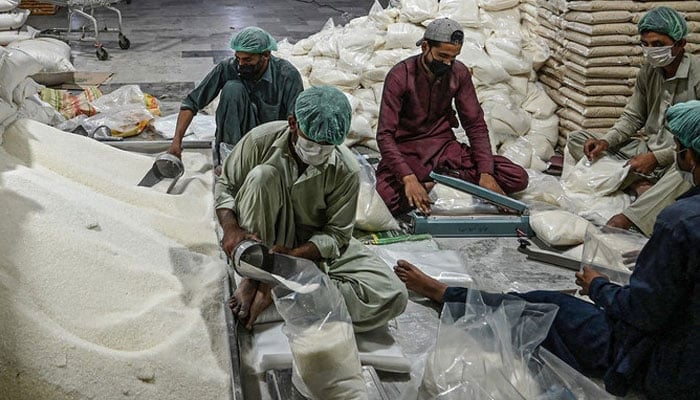Can deregulation transform sugar industry?
LAHORE: Advocating for the deregulation of the sugar trade, a leading industry representative has highlighted several factors that have enhanced the commodity’s competitiveness in the global market.
“We believe that a permanent opening of the sugar trade is crucial, as we are capable of competing internationally,” said a veteran sugar mill owner. He argued that existing restrictions have distorted the sugar trade, undermining fundamental business principles. According to him, it is not the government’s role to dictate how businesses should operate.
This call for deregulation comes as the Ministry of Finance has introduced new measures to regulate sugar prices. On Friday, a ministry official said that enforcing both retail and wholesale sugar prices will be a priority. The government will closely monitor sugar price fluctuations and continuously analyze the reasons behind rising prices. Daily price assessments will be conducted, with the Ministry of Industry providing regular updates to the Ministry of Finance on sugar pricing.
Commenting on the government’s approach, a representative from the sugar industry added that the government’s policy should focus on minimizing involvement. He referred to a policy note by the Competition Commission of Pakistan (CCP) on sugar price fixation, suggesting that if deregulation is to be considered, the CCP’s recommendations should be followed.
The CCP’s decision highlighted that many problems in the sugar sector arise from both excessive regulation and insufficient competition. Per the CCP, alternatives to price ceilings include deregulation, removing subsidies, and promoting market competition.
The sugar tycoon argued that trade restrictions end up controlling the entire industry. He noted that fluctuations in sugarcane cultivation and processing, driven by regulatory changes, have led to inconsistent sugar production. Overregulation and strict laws have skewed market dynamics, affecting both sugarcane and sugar pricing.
Several factors, including consecutive bumper sugarcane harvests, improved sugarcane quality and currency devaluation, have given the local industry a competitive advantage. The industry is confident in its ability to compete internationally and believes that now is the right time for the sugar sector to operate independently. The industry is aware of domestic market needs and price sensitivity, which is why it has helped maintain local sugar prices.
Given the surplus sugar and high international prices, the federal government should take decisive action to deregulate the sugar trade, he urged. This move would address current industry challenges and help break the cycle of oversupply that leads to government-imposed export restrictions and price drops, making production unprofitable.
When farmers lose interest in sugarcane production due to financial losses, production decreases. This reduction then drives up consumer prices, creating new challenges for both sugarcane farmers and the industry. This ongoing cycle of crisis and blame among stakeholders undermines the sector.
The rise and fall of sugar prices should not be attributed to sugar mills alone. Policymakers need to recognize that these fluctuations are largely a result of overregulation. If the government does not seize the opportunity to make the sugar industry a permanent player in the global market through deregulation, the sector may never achieve independent growth due to what he describes as excessive and unwarranted regulations.
-
 Celine Dion Reveals Music She's Listening To Lately
Celine Dion Reveals Music She's Listening To Lately -
 HR Exec Kristin Cabot To Speak At Crisis PR Conference After Coldplay Incident
HR Exec Kristin Cabot To Speak At Crisis PR Conference After Coldplay Incident -
 Why Travis Kelce Says Taylor Swift Has Made Him 'so Much Better'?
Why Travis Kelce Says Taylor Swift Has Made Him 'so Much Better'? -
 Halle Berry Credits This Hairstyle With Launching Her Acting Career
Halle Berry Credits This Hairstyle With Launching Her Acting Career -
 Hailee Steinfeld Spills Her 'no-phone' Rule With Husband Josh Allen
Hailee Steinfeld Spills Her 'no-phone' Rule With Husband Josh Allen -
 Bowen Yang Gets Honest About Post SNL Life: 'It’s An Adjustment'
Bowen Yang Gets Honest About Post SNL Life: 'It’s An Adjustment' -
 Charlize Theron Delivers Strong Message At 2026 Winter Olympics Opening Ceremony
Charlize Theron Delivers Strong Message At 2026 Winter Olympics Opening Ceremony -
 Lil Jon Reacts To Son Nathan Smith's Death: 'Devastated'
Lil Jon Reacts To Son Nathan Smith's Death: 'Devastated' -
 Bianca Censori Reveals Where She And Kanye West Stand On Having Children Together
Bianca Censori Reveals Where She And Kanye West Stand On Having Children Together -
 Taylor Swift Hypes Olympic Athletes In Surprise Video Message
Taylor Swift Hypes Olympic Athletes In Surprise Video Message -
 Timothy Busfield Charged With Four Counts Of Child Sexual Abuse
Timothy Busfield Charged With Four Counts Of Child Sexual Abuse -
 Amy Schumer Explains Why Her Sudden Photo Surge Is ‘not A Cry For Help’
Amy Schumer Explains Why Her Sudden Photo Surge Is ‘not A Cry For Help’ -
 Kanye West First Contacted Bianca Censori While In Marriage To Kim Kardashian?
Kanye West First Contacted Bianca Censori While In Marriage To Kim Kardashian? -
 Travis Kelce Reveals What His Nieces Really Do When He, Taylor Swift Visit
Travis Kelce Reveals What His Nieces Really Do When He, Taylor Swift Visit -
 Lola Young Makes Career Announcement After Stepping Back From Touring
Lola Young Makes Career Announcement After Stepping Back From Touring -
 Priyanka Chopra Shares Heartfelt Message For Nick Jonas
Priyanka Chopra Shares Heartfelt Message For Nick Jonas




